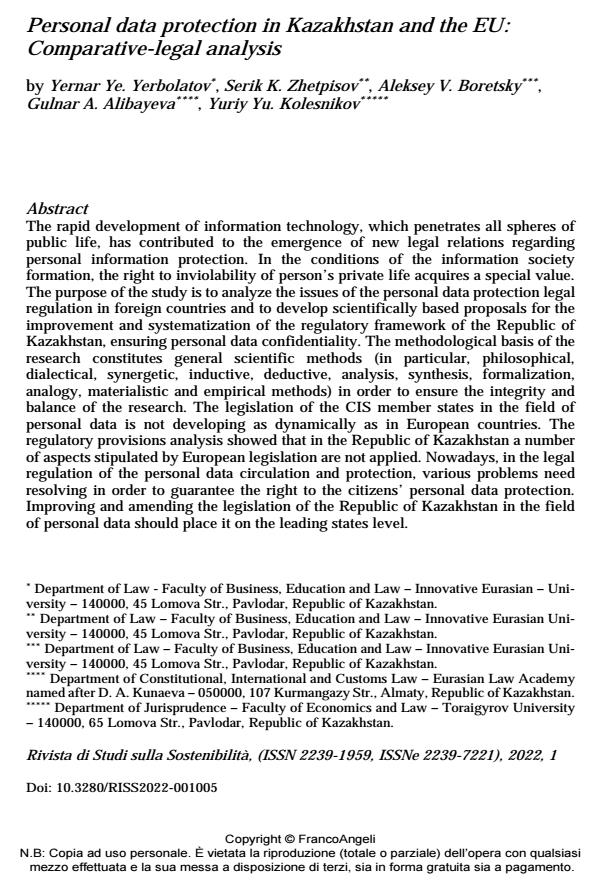Personal data protection in Kazakhstan and the EU: Comparative-legal analysis
Titolo Rivista RIVISTA DI STUDI SULLA SOSTENIBILITA'
Autori/Curatori Yernar Ye. Yerbolatov, Serik K. Zhetpisov, Aleksey V. Boretsky, Gulnar A. Alibayeva, Yuriy Yu. Kolesnikov
Anno di pubblicazione 2022 Fascicolo 2022/1
Lingua Inglese Numero pagine 20 P. 69-88 Dimensione file 107 KB
DOI 10.3280/RISS2022-001005
Il DOI è il codice a barre della proprietà intellettuale: per saperne di più
clicca qui
Qui sotto puoi vedere in anteprima la prima pagina di questo articolo.
Se questo articolo ti interessa, lo puoi acquistare (e scaricare in formato pdf) seguendo le facili indicazioni per acquistare il download credit. Acquista Download Credits per scaricare questo Articolo in formato PDF

FrancoAngeli è membro della Publishers International Linking Association, Inc (PILA), associazione indipendente e non profit per facilitare (attraverso i servizi tecnologici implementati da CrossRef.org) l’accesso degli studiosi ai contenuti digitali nelle pubblicazioni professionali e scientifiche.
The rapid development of information technology, which penetrates all spheres of public life, has contributed to the emergence of new legal relations regarding per-sonal information protection. In the conditions of the information society for-mation, the right to inviolability of person’s private life acquires a special value. The purpose of the study is to analyze the issues of the personal data protection legal regulation in foreign countries and to develop scientifically based proposals for the improvement and systematization of the regulatory framework of the Republic of Kazakhstan, ensuring personal data confidentiality. The methodological basis of the research constitutes general scientific methods (in particular, philosophical, dialectical, synergetic, inductive, deductive, analysis, synthesis, formalization, analogy, materialistic and empirical methods) in order to ensure the integrity and balance of the research. The legislation of the CIS member states in the field of personal data is not developing as dynamically as in Europe-an countries. The regulatory provisions analysis showed that in the Republic of Kazakhstan a number of aspects stipulated by European legislation are not ap-plied. Nowadays, in the legal regulation of the personal data circulation and pro-tection, various problems need resolving in order to guarantee the right to the citi-zens’ personal data protection. Improving and amending the legislation of the Re-public of Kazakhstan in the field of personal data should place it on the leading states level.
Parole chiave:personal information; confidential information; public figures; the right to privacy; protection of personal data.
- Vulnerability of personal data of Kazakhstani citizens and the need to implement the European experience Serik Zhetpissov, Nursulun Mussabekova, Gulnar Alibayeva, Olga Dubovitskay, Zhadyra Talipova, in RIVISTA DI STUDI SULLA SOSTENIBILITA' 2/2024 pp.305
DOI: 10.3280/RISS2024-002017
Yernar Ye. Yerbolatov, Serik K. Zhetpisov, Aleksey V. Boretsky, Gulnar A. Alibayeva, Yuriy Yu. Kolesnikov, Personal data protection in Kazakhstan and the EU: Comparative-legal analysis in "RIVISTA DI STUDI SULLA SOSTENIBILITA'" 1/2022, pp 69-88, DOI: 10.3280/RISS2022-001005